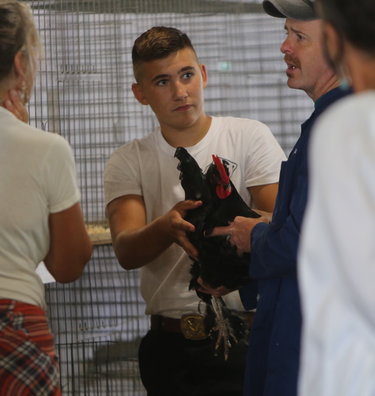As fair season starts, bans on poultry exhibits lifted
The Altamont Fair will be able to exhibit poultry after all.
The bans on live poultry shows, exhibitions, auctions, sales, meets, and swaps in New York State have been lifted.
The state’s agriculture department had previously issued the bans on March 25 and April 14 as highly pathogenic avian influenza spread across the United States, including in New York State.
According to the U.S. Centers for Disease Control and Prevention, the public-health risk associated with these avian influenza detections remains low.
In 2014 and 2015, an especially serious outbreak of the disease resulted in the death of 50 million birds across 15 states. As a result of that outbreak, but more out of precaution than because of significant local impacts, the Altamont Fair had to cancel its annual bird show, the fair’s poultry superintendent, Father Jeffrey L’Arche, told The Enterprise in March.
In 2015, that state’s Department of Agriculture and markets had banned all live fowl competitions.
The decision to lift the recent bans comes as cases decrease nationwide, including in New York, which has not had a detection of flu in nearly two months, according to a release from the department.
Additionally, as the state enters agricultural fair season, phylogenetic studies have shown that the majority of flocks affected in the current outbreak were infected by introductions from wild birds, rather than by farm-to-farm transmission, lending additional confidence to the decision to allow commingling of poultry again, the release said.
To date, eight flocks in New York have tested positive for HPAI, with the last detection in a Fulton County flock on April 6.
Commercial and hobby poultry farmers should continue practicing good biosecurity measures to help prevent the spread of the disease, the release says; the department encourages all poultry producers, from small backyard to large commercial operations, to review their biosecurity plans and take precautions to protect their birds. Poultry biosecurity materials and checklists can be found on the USDA’s “Defend the Flock” website.
Best practices
Best practices, the department says, to prevent transmission of disease at poultry shows or swaps include:
— Always transport birds in crates that have been cleaned and disinfected between uses;
— Do not share equipment or supplies with other exhibitors. Always clean and disinfect any equipment between uses, and especially upon return from a fair, swap, or show;
— If you take some of your birds to a fair or exhibition, be sure to keep them separated from the rest of your flock for at least 21 days upon return and observe for signs of illness;
— Keep new additions to your flock separated for at least 30 days before commingling them with the rest of your flock. Be sure to monitor them for any signs of disease;
— Only purchase birds from reputable sellers and inspect birds thoroughly before purchase. Consider only buying from flocks that participate in the National Poultry Improvement Plan;
— Always wear clean clothes and footwear when entering areas where poultry are housed;
— Be sure to wash your hands with soap and water before and after handling or caring for your birds;
— If there are any signs of illness or abnormalities in your flock, leave your birds home. Do not bring them to fairs, shows, or other events where they will come into contact with other birds;
— Know the signs of HPAI: sudden death of birds, drop in egg production or misshapen eggs, lack of energy or reduced appetite, respiratory signs including nasal discharge or difficulty breathing, swelling of the eyes and head, or purplish discoloration of combs, wattles, or legs; and
— Report sick or dying poultry to the department at 518-457-3502 or dai@agriculture.ny.gov.



